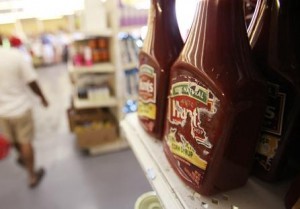Salvaged Food

Shopping at these stores, though, is inherently different than coupon-clipping or even monitoring the Walmart rollbacks. There are many ways to look at the role of salvage stores in the larger economy — not all of them positive — but one hails salvage store customers for making sure products don’t unnecessarily go to a landfill.
“America is very wasteful, very wasteful, and in our business we see a lot of it,” Mary Jane says. “Some people are really hung up on [product sell-by] dates, so they’re just not interested in what we do, but that just leaves it for the rest of them.”
I have never seen a salvage store like Greene County Damaged Freight and Foods, which sells food at deep discounts because they’ve reached their sell-by dates or have been damaged during transportation, but I would certainly not be averse to shopping at one.
The FDA is aware that these stores exist, acknowledges that expired sell-by dates don’t “necessarily mean that a food has gone bad or is unsafe,” and provides a list of things to look out for when shopping at a salvage store (i.e. swollen cans of food probably have bacteria growing inside waiting to kill you).
Freegans have been diving in grocery store dumpsters to salvage food for quite a while now, and every week I play this game called “is this milk still okay to drink?” This game involves a lot of sniffing, pondering, and preparing to spit into the sink if necessary. I’d have no problem shopping at a salvage store to find a few deals.
Support The Billfold
The Billfold continues to exist thanks to support from our readers. Help us continue to do our work by making a monthly pledge on Patreon or a one-time-only contribution through PayPal.
Comments